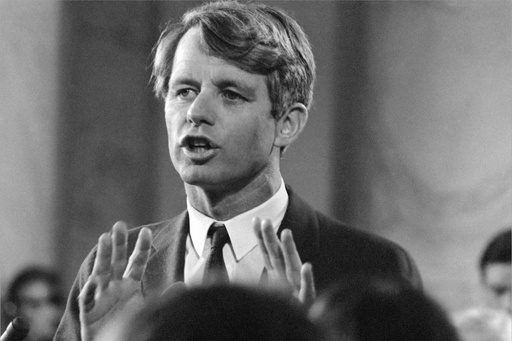On Thursday, the CIA unveiled close to 1,500 pages of previously classified documents, shedding light on the involvement of New York Senator Robert F. Kennedy and the circumstances surrounding his assassination in 1968. These documents also reveal previously undisclosed interactions between Kennedy and the CIA.
Records illustrate that following a 1955 trip to the Soviet Union, Kennedy engaged with the CIA, sharing his observations as a voluntary informant. This newly released collection includes 54 documents, which cover memos regarding the agency’s efforts to determine if RFK’s assassin had any international connections and the global reactions to his murder. Additionally, these files contain information on the assassinations of President John F. Kennedy, Martin Luther King Jr., and the attempted assassination of Alabama Governor George Wallace in 1972.
Among the documents, an internal CIA memo discusses the unsuccessful attempts to assassinate Cuban leader Fidel Castro using poison in 1960 and 1961. It reveals collaboration with a “high-ranking” Las Vegas Mafia figure who “controlled all of the ice-making machines on the Strip.”
Another memo from December 1973 reported on a Georgetown University conference where conspiracy theories about assassinations were discussed. The memo described a speaker as “long-winded and technical,” with a notable presence of attendees with “beards and long hair,” contrasting with the conventional clean-shaven appearance expected of government employees at the time.
Under President Donald Trump’s directive, documents related to the assassinations of RFK, JFK, and King have been released. Over 10,000 pages of records concerning RFK’s assassination were made public in April, and the latest release also includes files on JFK and King’s assassinations, some produced after RFK’s death that address conspiracy theories.
CIA Director John Ratcliffe stated, “Today’s release delivers on President Trump’s commitment to maximum transparency, enabling the CIA to shine light on information that serves the public interest. I am proud to share our work on this incredibly important topic with the American people.”
Kennedy was assassinated on June 5, 1968, at the Ambassador Hotel in Los Angeles shortly after delivering a speech to celebrate his success in California’s presidential primary. His assassin, Sirhan Sirhan, was found guilty of first-degree murder and remains incarcerated for life. Among the recent documents is a CIA memo to the White House, drafted the day after the assassination, which revealed that initial searches yielded no information about Sirhan.
Kennedy’s interactions with the CIA post-Soviet visit represent the heightened tensions of the era and the importance placed on firsthand accounts from Americans visiting the USSR. Elected officials and business leaders who traveled there were often approached for their insights upon returning. The documents highlight RFK’s role as a voluntary informant.
The CIA, in a statement, expressed that these meetings demonstrated RFK’s “patriotic commitment” to his country. Many of his observations offered detailed insights into daily life. In one instance, Kennedy noted, “On 29 Aug 55, while in Novosibirsk, USSR, a friend and I visited a State machine factory. The factory has 3,500 employees, of whom one-third are women. The wage scale is between 840 and 2,500 rubles,” adding that he couldn’t recall the factory director’s name but described him as “frosty” whereas the engineer was amicable.
The CIA employed artificial intelligence techniques to examine its archives for RFK-related assassination documents eligible for declassification. This search surfaced numerous documents, including records of RFK’s CIA meetings, even if not directly linked to his murder.
Robert F. Kennedy Jr., current U.S. Health and Human Services Secretary and son of RFK, expressed gratitude for the release of these documents, saying, “Lifting the veil on the RFK papers is a necessary step toward restoring trust in American government.”
Included in the release is a memo from September 1975 from then-CIA Director William Colby to his staff, addressing recurring allegations of CIA involvement in JFK’s assassination on November 22, 1963. Colby affirmed that assassin Lee Harvey Oswald had no connection with the agency, noting that while five CIA records mentioned Oswald prior to the assassination, his name bore no significant meaning before that tragic day. For an intended interview with CBS White House correspondent Dan Rather in October 1975, Colby was prepared with talking points denying CIA involvement in testing the vulnerability of New York City’s subways to biological warfare agents.



